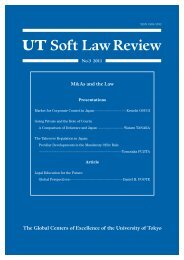UT Soft Law Review
UT Soft Law Review
UT Soft Law Review
Create successful ePaper yourself
Turn your PDF publications into a flip-book with our unique Google optimized e-Paper software.
<strong>UT</strong> <strong>Soft</strong> <strong>Law</strong> <strong>Review</strong> No.2 2010and the Ministry of Justice (“Guidelines”). 6 It must be noted that while the NipponBroadcasting case involved a “post-bid” defense, these documents are for “pre-bid” defensivemeasures, and public firms began to introduce a variety of pre-bid defensive measuresbeginning mid-2005.The Guidelines, although they are not the law, list three basic principles for the validity ofpre-bid defense measures. 7 First, the purpose of such defense measure must be to enhancecorporate value and thus shareholders’ value as a whole. Second, the adoption of suchdefense plan must be based on the shareholders’ will. Finally, such defense measure must benecessary and satisfy proportionality, namely, they must be a reasonable and non-excessivemeans to accomplish the purpose. Also, the Guidelines specifically discuss the issuance ofstock warrants. They provide that if such warrants are issued by a decision at theshareholders’ meeting, its validity or compliance with the three principles would be presumed.If such warrants are issued by a board decision without a shareholders’ meeting, necessityand proportionality would have to be strictly required.In the course of these quick developments, a couple of changes in the relevant statuteswere made. First, the Ministry of Justice (“MOJ”) promulgated a disclosure rule for defensivemeasures, effective on May 1, 2005. A joint-stock company is required to disclose itsfundamental policy for its management in its annual business report. 8 This rule applies to thefiscal year ending on or after May 1, 2005, and it means that most public firms began todisclose such policy in 2006. Second, the Subcommittee on Corporate Governance at theLiberal Democratic Party discussed this area in the first half of 2005 and released animportant report on July 7, 2005. 9 This report endorsed one type of poison pill using a trustscheme by making clear of its tax implications. In addition, the report called for a fewchanges of tender offer regulation. The bill for wide-range reform of the Securities andExchange Act (“SEA”) (which includes the tender offer regulation) was passed in the Diet inJune, 2006, and the proposed changes by the Subcommittee were included. The relevant partof the regulation became effective on December 13, 2006. In this connection, the FinancialServices Agency (“FSA”), which has jurisdiction over tender offer regulation, made detailedrules under the amended SEA. Among others, when a tender offer is commenced, the targetboard has the legal right to ask questions to the bidder and the bidder must answer them intheir public documents. A European style mandatory bid rule (which requires the bidder tobid for all outstanding shares) was introduced, but only where the bidder attempts to acquire2/3 or more of the target shares. Finally, Tokyo Stock Exchange (“TSE”) has been serious in6 Ministry of Economy, Trade and Industry and Ministry of Justice, Guidelines regarding Takeover Defensesfor the purposes of Protection and Enhancement of Corporate Value and Shareholders’ Common Interests,May 27, 2005.7 See supra note 6.8 See Article 127, Ministry of Justice Companies Act Implementation Rule (2005).9 Report of the Subcommittee on Corporate Governance, Liberal Democratic Party, July 7, 2005.4





